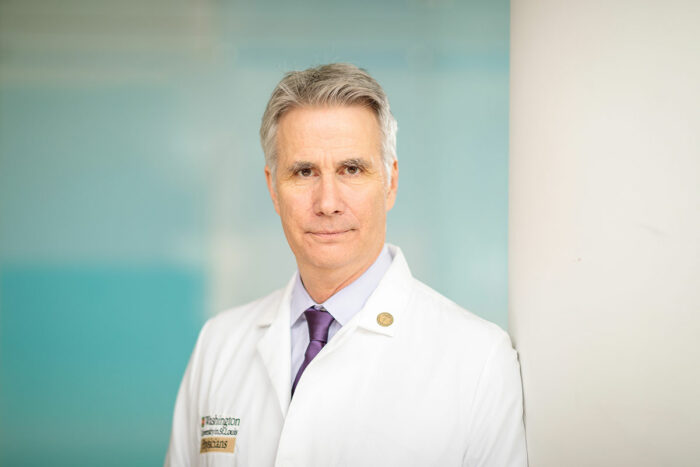Cote named head of pathology and immunology
Cancer physician, scientist, entrepreneur plans to build on strong research, clinical programs
 Matt Miller
Matt MillerRichard Cote, MD, has been named head of the Department of Pathology and Immunology at Washington University School of Medicine in St. Louis. A physician-scientist and entrepreneur specializing in cancer, Cote will begin in his new role May 1.
Richard J. Cote, MD, an innovative physician-scientist and entrepreneur specializing in cancer, has been named head of the Department of Pathology and Immunology at Washington University School of Medicine in St. Louis. He will take the reins May 1.
Cote comes from the University of Miami Miller School of Medicine, where he is the Joseph R. Coulter Jr. Professor of Pathology and a professor of biochemistry and molecular biology. His appointment was announced by David H. Perlmutter, MD, the George and Carol Bauer Dean of the School of Medicine, executive vice chancellor for medical affairs and the Spencer T. and Ann W. Olin Distinguished Professor.
“We are very fortunate to have attracted Dr. Cote to this important leadership position,” Perlmutter said. “Richard is not only a dedicated physician, he has performed groundbreaking research and developed innovative new technologies to improve patient care. As one of the founders of a nationally recognized nanotechnology research institute, he has shown outstanding organizational and leadership skills.”
Cote succeeds interim head Charles Eby, MD, and former head Herbert “Skip” Virgin IV, MD, PhD. Virgin led the department from 2006 to 2017, stepping down to become executive vice president of research and chief scientific officer at Vir Biotechnology in San Francisco.
Cote, a founding director of the Dr. John T. Macdonald Foundation Biomedical Nanotechnology Institute at the University of Miami, is well-known for his research on tumor progression and response to therapy. He led three of the largest clinical trials in breast, lung and bladder cancer, which were based on research from his laboratory.
He has shown that the accumulation of mutations in tumor-suppressor genes can predict the outcomes of bladder cancer. These findings led to an international multicenter trial to treat bladder cancer by targeting the tumor-suppressor pathway. In seminal breast cancer trials, he has shown that hidden lymph node and bone metastases, undetected by conventional testing, have a major impact on patient outcomes.
With the help of funding from the National Cancer Institute, Cote and his colleagues are developing a tool to detect early-stage breast cancer and predict how the disease will progress by analyzing tumor cells in the bloodstream.
He holds numerous patents and is the founder of several biotech companies, including Impath, Clarient, Filtini and Sensitini. One of the first companies to bring specialty testing for cancer analysis to market, Impath was acquired by Genzyme in 2004. Clarient, an image analysis company co-founded by Cote under the name Chromavision, brought high-tech diagnostic capabilities to practicing pathologists and oncologists. Clarient was acquired by GE in 2009.
Cote continues to maintain an active clinical practice focused on the diagnosis of breast and genitourinary cancers.
As head of pathology and immunology, Cote plans to build on the department’s exceptional track record in research, patient care and training. The department operates on the principle that basic research is fundamental to advancing patient care and serves as a vital bridge between the basic sciences and other clinical disciplines at Washington University. Its strengths are diverse – from basic immunology and immunotherapy to cancer vaccine development, the microbiome, infectious diseases and other fields under the umbrella of pathology such as neuropathology and laboratory and genomic medicine.
“It is a great honor to be joining the outstanding leaders and faculty of Washington University School of Medicine and the Department of Pathology and Immunology,” Cote said. “The School of Medicine is one of the top institutions in the country and world, a position it has held for many decades. The pathology and immunology department has changed the way we think, discover, advance, educate and practice.
“I hope to build on the cutting-edge research and develop basic and translational programs in collaboration with the outstanding centers, institutes and departments across the entire university to improve patient care,” he continued. “The department is poised to substantially expand its clinical services, providing an increasing number of patients and clinicians with high-quality diagnostic services to deliver more precise patient care. The department has long been a cornerstone of medical education and postgraduate training, and we plan to build on that tradition. This is an exciting and challenging time in American science and medicine, and there is no better place to impact the future than Washington University, the School of Medicine, and the Department of Pathology and Immunology.”
Cote spent 19 years on the faculty at the University of Southern California before moving to the University of Miami in 2009 as chair of the pathology department. During his tenure, he led a re-organization and modernization of subspecialty pathology practice and oversaw substantial growth in the department’s clinical and research programs.
Cote earned his undergraduate degrees in chemistry and biology at the University of California, Irvine, then a medical degree at the University of Chicago. He completed residency at New York Hospital-Cornell University Medical College, followed by a clinical fellowship in pathology at Memorial Sloan Kettering Cancer Center, then research fellowships in human tumor immunology at Memorial Sloan Kettering and in molecular pathology at New York University. In addition to serving in a number of advisory roles to the National Cancer Institute, he has received many honors and awards, including election to the Association of American Physicians.






